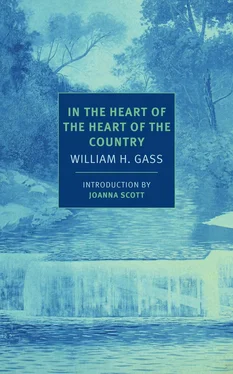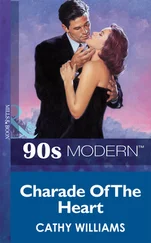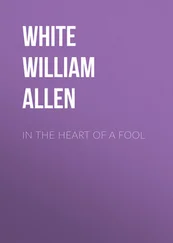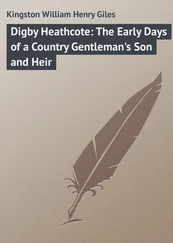I drove them together… an unpleasant end for so pleasant a beginning.
Mr. Wallace was before at large, as I have said; gigantic in the landscape, swallowing life. There was, in him, no respect for my mysteries, only for his own: signs, omens, portents, signatures and symbolings whose meaning he alone was privy to. Mr. Wallace was the paramour of prophecy, yet it came to me when the boy Toll catted across his path that day that it was a stone symbolic more than real that struck the light from Goliath’s eyes. It was for prophecy that Jonah fled the Lord. For Jonah’s flight the tempest rose, and for the tempest was Jonah flung between the whale’s jaws. To be properly swallowed, then, was the secret; to cause, in going down, the oils to flow that would convulse the membranes of the stomach. What must that whale have felt, his moist cavernous maw reverberating prayers and pledges! Would Mr. Wallace be a dog and eat his vomit? I judged that I should soon be cast on dry land. Thenceforth the mystery would be mine, as it was Jonah’s. To be the bait, to carry the harpoon down and in that round and previously unshaken belly stick it, then escape — that would be the trick. And prophecy would do it.
How I was enamored of the notion! All day I lightly walked. Mr. Wallace obliged me by appearing almost at once to record his aches, to dilate upon the midnight’s weather, and to wallow surely, by absolutely predictable thrashes, toward the topic. I was on a vast dry plain. Red rock rose out of its distances. Behind me and before me there were multitudes embannered — murmuring. The sun’s light struck from shields and spears. I squinted at the giant. His figure wavered. I sensed the wet and dry together. Perhaps the ancient Greek philosophers were right about the wedding of these opposites. Dust clouded my shuffling feet. Spume flew to the giant’s face. It is amazing how the feelings of the universal fables sometimes focus in a single burning vision. Of course that singleness of sight has always been my special genius.
I waited. The ankles were painful. I said I had a mole that itched. A bad sign, Mr. Wallace said, and I saw the thought of cancer fly in his ear. Moles are special marks, he said. I was aware, I said, of how they were, but the places of my own were fortunate and I divined from them a long life. Moles go deep, I said. They tunnel to the heart. Mr. Wallace grinned and wished me well and with great effort turned away. It was a good start. Wonder and fear began in him and twitched his face. When again he came he thought aloud of moles and I discoursed upon them: causes, underflesh connections, cosmic parallels, relations to divinity. There was a fever in him, dew on his lip, brightness in his eye. Moles. Every day. At last there was no art in how he brought the subject up. I spoke of the mark of Cain. I mentioned the deformities of the devil. I talked of toads and warts. I discussed the placing of blemishes and the ordering of stars. Stigmata. The world of air is like the skin and signs without are only symbols of the world within. I referred to the moles of beauty, to those of avarice, cunning, gluttony and lust, to those which, when touched, made the eyes water, the ears itch, or caused the prick to stand and the shyest maid to flower. My fancy soared. I related moles and maps, moles and mountains, moles and the elements of interior earth. Oh it was wondrous done! How he shook and warmed his lips like an old roué and trembled and put anxiety in every place! I was everywhere specific and detailed. This may correspond to that . The region of the spine is like unto the polar axis. But I was at all times indeterminate and vague as well. A certain horn-shaped mole upon a certain place may signify a certain spiritual malignity. I informed him of everything and yet of nothing. I moved his sight from heaven to hell and drew from him the most naïve response of bliss, followed first by a childlike disappointment as our viewpoint fell, then a childlike fright. His cane quivered against the pavement. He was in the grip. To be so near, continually, to dying; to feel within yourself the chemistry of death; to see in the glass, day by day, your skull emerging; to rot while walking and to fear the sun; to pick over the folds of your loosening flesh like infested clothing; to know, not merely by the logician’s definition or the statistician’s count that men are mortal, but through the limpsting of your own blood — to know so surely so directly so immediately this, I thought, would be a burden needing, if a man were to bear up under it, a staff of self-deceiving hope as sturdy and leveling as the truth was not: an unquenchable, blasphemous, magical hope that the last gasp when it came would last forever, death’s rattle an eternity.
There were moles upon that body I was certain. And he would want to know their meaning. It wouldn’t matter if he had, before me, given sense and order to their being; these things despair of guarantee. He would want to know. He would have to know. And he would fear to know. What if I said: This is the mole of death most painful? Yet what if I said: This is the mole of everlasting mortal life? What if a miracle should happen? What if?
I waited. Again and again he came, nibbling. Excitement, worry, anticipation, profoundest thought passed and repassed like winds across him. Finally I broached the deadly topic. Mr. Wallace showed his teeth and his eyes hunted in the trees. His cane chattered. He admitted his wife had a mole or two. Ah, I said, where are they? Mr. Wallace blew his nose and bade farewell. Not yet. The rogue would offer up his wife. He wanted a safe bite, a free taste of the news. Well I should freely give it. I worried only that the shriveled witch had moles upon her privates — this shame silencing speech. Such a sign, if I could pronounce upon it, I would deed the whole of fortune to.
Again and again he came until I grew so sick of the smell of oil and the sound of water that I thrust the question boldly toward him. Each time, in silence, he refused it. Again and again he came. I had no heart any more. I feared his coming. I hesitated to enter my yard. And then he said that there were moles upon her body, on her thigh. The thigh, I exclaimed, the home of beauty. The right side or the left? The left. The left! Momentous conditions are being satisfied. Are they low upon it? high? Near the hip. The hip! Glorious! Were there two? Two. Two! And the color: brown? red? black? Yellow. Yellow! What a marvel! And the hair that grew there? the color of the hair that grew there? Surely there was hair. There must be. My friend, you must look again. Look again. Again. Determine it precisely.
So he sounded with the bait. He was hooked through his throat to the tail.
Even now I dare not let my mind look upon the picture of that pair peering beneath her lifted skirts. How infernally lewd! How majestically revolting! She would ask him if he saw any. He would hesitate, realizing more than she how important it was to say yes, and yet not clearly, not surely finding grounds for an affirmation. He moistens his finger and applies it to the spot. Perhaps a brighter light. Perhaps if she removed her dress. In worry she watches him. What does it all mean? Can they say for certain that hair grows there; that it does not? She is persuaded to pronounce the negative but he holds her back. There is a doubt. There must be a doubt.
Or he has kept the substance of our conversations from her. He spies out her moles, creeps upon her dressing, at her bath, or he remembers lovelier days when he was whole and she was smooth and clean and there was flesh to glory in. Then those moles were yellow on her hip perhaps like beads inviting kisses. No. I see the moistened finger, the hiked skirt, the inquiring frown. I see it clearly, bright with color, dimensional with shadow. There is somehow a bond between them greater than comfort. She is a nurse. She is a wife. But what else really? Was there a time when that same finger touched her thigh with love? I consider it and shudder. The mind plays strange games. No. No youth for them. They were always old. Does that finger touch her now with any tenderness or is it, as I rather fancy, like the touch of a dry stick?
Читать дальше












